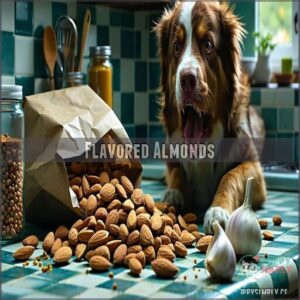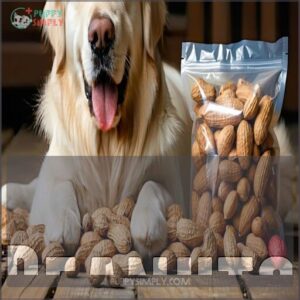This site is supported by our readers. We may earn a commission, at no cost to you, if you purchase through links.

While they’re not toxic like some other nuts, almonds are hard for dogs to digest and can cause stomach upset, vomiting, or diarrhea.
Their small size makes them a choking hazard, especially for smaller breeds, and flavored or seasoned almonds might contain harmful ingredients like salt or artificial additives.
In some cases, eating almonds can even lead to pancreatitis, a painful and potentially serious condition.
If your dog’s begging for a snack, stick to safer options like plain peanuts or a spoonful of unsalted peanut butter, and be aware of the risks associated with almonds and other nuts, to ensure your dog’s health and safety, and consider safer options.
Curious about other nuts?
Let’s explore those next.
Table Of Contents
- Key Takeaways
- Almonds and Dog Health
- Can Dogs Eat Almonds
- Almond Varieties Risks
- Safe Alternatives to Almonds
- Almond Products Safety
- Toxic Nuts and Prevention
- Frequently Asked Questions (FAQs)
- Will my dog be ok if he ate one almond?
- What nut is toxic to dogs?
- What are the benefits of almonds for dogs?
- Are flavored almonds safe for dogs to eat?
- What are the signs of almond consumption in dogs?
- Are there any other foods that might be harmful to dogs?
- What is the AKC’s e-book about responsible dog ownership?
- Is almond butter safe for dogs to eat?
- Are almond shells harmful to dogs?
- What symptoms indicate acute almond poisoning?
- Conclusion
Key Takeaways
- Dogs shouldn’t eat almonds as they’re difficult to digest and can cause vomiting, diarrhea, or other digestive issues.
- Whole almonds pose a choking risk, especially for small breeds, and flavored or salted almonds can be harmful due to added ingredients.
- Almonds’ high fat content can trigger pancreatitis, a serious and painful condition for dogs.
- Safer alternatives include plain peanuts, unsalted peanut butter, and roasted chestnuts in moderation.
Almonds and Dog Health
Almonds aren’t toxic to dogs, but they can cause serious health issues. From digestion problems to choking risks, it’s important to understand why these nuts should be avoided.
Gastric Intestinal Distress
When a dog eats almonds, it can lead to gastric distress.
Dogs eating almonds may face gastric distress, leading to vomiting, diarrhea, or gas—keep these nuts off your pup’s menu!
Dogs struggle to digest these nuts, causing vomiting, diarrhea, or gas.
Appetite loss and lethargy are common signs of gastrointestinal issues.
Almonds for dogs are a bad idea as they irritate stomachs, especially in small breeds.
Always monitor for symptoms and seek help if needed, as gastrointestinal issues can be serious.
Pancreatitis Risk
The high fat content of almonds for dogs can trigger pancreatitis, a serious inflammation of the pancreas.
Dog pancreatitis symptoms include vomiting, diarrhea, and abdominal pain, with severity factors varying by breed susceptibility and overall health.
Digestive enzymes struggle to process excess fat, increasing risks.
Preventative measures include avoiding almonds entirely and consulting your vet immediately if ingestion occurs. High calorie nuts can also contribute to this dangerous condition, so it’s best to avoid them and choose safe treats.
Obstruction Hazards
When considering almonds for dogs, blockages are a real concern.
Whole almonds can cause an esophageal blockage, intestinal obstruction, or windpipe hazard, especially for small breeds or puppies.
Choking is a top almond risk dogs face.
Severe cases might need surgical intervention.
Dog almond consumption isn’t worth the trouble.
Always prevent access to almonds to avoid these serious risks.
Can Dogs Eat Almonds
You may wonder, "Are almonds safe for dogs?" The simple answer is no.
While almonds aren’t toxic, they’re difficult for dogs to digest. Almond digestion can lead to issues like vomiting, diarrhea, and gas.
Whole almonds are a choking hazard, especially for small breeds, as they can block the esophagus or windpipe. Packaged almonds are even worse due to high salt levels, which can cause salt toxicity and strain a dog’s kidneys.
Over time, this can increase the risk of kidney stones. If your dog sneaks a few almonds, don’t panic. Monitor symptoms closely, like difficulty breathing or lethargy, and contact a veterinarian if problems arise.
It’s best to keep almonds for dogs completely off the menu.
Almond Varieties Risks
Not all almonds are created equal, and some types pose unique risks for your dog.
From bitter almonds to flavored varieties, these nuts can introduce health hazards beyond simple digestion issues, including risks that make some types particularly hazardous.
Chinese Almonds
Chinese almonds look similar to regular almonds but pose a serious threat to your dog.
Chinese almonds resemble regular almonds but are dangerously toxic, containing cyanide that can harm dogs even in tiny amounts.
These aren’t true almonds and contain traces of cyanide that can be poisonous to pets.
Roasting or blanching is required before any consumption.
Dogs should never eat Chinese almonds due to their toxicity levels.
Even small quantities can lead to almond poisoning in dogs, making them completely unsafe as treats.
Bitter Almonds
Like their Chinese counterparts, bitter almonds pose serious dangers to your dog.
They contain cyanide, making them poisonous and unsuitable for canine consumption.
Bitter almonds aren’t meant for direct human consumption either due to their high toxicity levels.
The refining process removes dangers for commercial products, which is why you’ll find bitter almonds in liqueurs and extracts.
Never feed these to your dog—almond poisoning requires immediate veterinary attention.
Other nuts like macadamia nuts are also toxic, but safe nuts exist in moderation, and it’s crucial to understand what nuts are safe for dogs to eat to avoid toxic situations.
Flavored Almonds
Flavored almonds pose several hidden dangers to your dog beyond the risks of regular almonds.
These popular snack varieties can harm your pet in multiple ways:
- Artificial flavors and sweeteners can trigger spice sensitivities in dogs
- High salt content leads to water retention and salt toxicity
- Seasonings like garlic and onion powder are toxic to canines
- Spices irritate your dog’s stomach, causing severe gastric intestinal distress
Safe Alternatives to Almonds
You can safely treat your dog with peanuts, peanut butter, and roasted chestnuts instead of almonds.
These alternatives provide tasty options that won’t cause the digestive issues associated with almond consumption.
Peanuts
Peanuts are a safe, dog-friendly alternative to almonds when plain and unsalted.
They’re non-toxic and packed with nutrition, including protein and vitamins like E and B.
While dogs can’t digest almonds well, peanuts make a healthier treat in small amounts.
Many owners buy unsalted peanuts for dogs as a special treat.
Always check for peanut allergies and avoid salted or flavored peanuts to keep your canine companion happy and healthy.
Peanut Butter
Peanut butter is a great treat if given responsibly.
It offers vitamin E, B, and omega-3s that support health.
Use peanut butter to hide pills or as a snack, but avoid brands with xylitol or added sugars.
Stick to small portions to prevent weight gain.
You can even find specialized options online made just for dogs.
While dogs can’t eat almonds safely, peanut butter is a better and dog-friendly option.
Roasted Chestnuts
Roasted chest can be a safe and healthier alternative for dogs compared to almonds.
They’re low in fat and easy to digest when plain, unsalted, and unseasoned.
Avoid harmful additives and consider dog-friendly roasting methods.
Always watch for potential chestnut allergies or choking risks, especially in smaller breeds.
Chestnuts offer great nutrition but should be enjoyed by dogs in moderation.
Almond Products Safety
Regarding almond-based products like almond butter, milk, or oil, you’ll need to be cautious about what your dog consumes.
While some forms might seem safe, ingredients and portion sizes can make all the difference.
Almond Butter
Almond butter can be a safe treat for dogs if used sparingly and made with care.
Stick to plain, unsalted, and xylitol-free options to avoid almond toxicity risks.
Serving size matters; small amounts work best.
Homemade recipes offer control over ingredients, ensuring safety.
While it boasts nutritional benefits, such as vitamin E, be cautious to prevent almond poisoning in dogs.
Almond Milk
Almond milk isn’t toxic, but it’s not ideal for dogs.
Dogs can’t process lactose, and almond milk’s high fat content may lead to upset stomachs or even pancreatitis.
If spilled, clean up quickly to avoid overconsumption.
It’s best to avoid using almond milk in puppy diets. Safer milk alternatives or dog-specific recipe ideas are better options.
Some dogs experience lactose intolerance symptoms after consuming dairy.
Almond Oil
Almond oil can benefit a dog’s skin and coat health, but it’s not the safest option.
Use it topically, not for eating.
For safety:
- Pick vet-approved brands.
- Avoid giving large doses.
- Check for allergies with small amounts first.
- Never use almond oil processed for humans.
- Always consult your vet for dosage guidelines.
Dogs don’t need almonds to thrive.
Many owners buy almond oil products for their pets.
Toxic Nuts and Prevention
Some nuts, like macadamias and walnuts, are highly toxic to dogs and can cause serious health issues.
Knowing which nuts to avoid and keeping them out of reach is key to keeping your dog safe.
Macadamia Nuts
Macadamia nuts are among the worst nuts for dogs, causing Macadamia Toxicity even in small amounts.
Ingestion symptoms include vomiting, weakness, tremors, and loss of coordination.
No safe amounts exist, so avoid them entirely, as Breed Sensitivity may vary, but any dog can suffer.
Immediate veterinary care is critical for dog nut toxicity, so stick to dogsafe foods to guarantee your dog’s health.
Pecans
Pecans aren’t safe for dogs. They contain juglone and aflatoxins, both harmful substances linked to pecan poisoning. Even small amounts can upset your dog’s stomach.
Problems like dog nut toxicity and pancreatitis are common. One major concern is the risk of aflatoxin and juglone exposure.
- High fat content increases obesity risks.
- Moldy pecans worsen aflatoxin exposure.
- Even unshelled pecans pose choking hazards.
- Symptoms of dog pecan toxicity include vomiting and lethargy.
Pistachios
Pistachios aren’t dog-friendly due to pistachio toxicity and aflatoxin concerns.
Mold can produce toxins that harm your dog’s liver. Shell risks, like choking hazards and intestinal blockage, make them especially dangerous.
Even a shelled pistachio’s high fat content isn’t ideal for dogs. If your dog eats pistachios, monitor for vomiting or lethargy and consult your vet.
Choose safe nuts instead, to avoid the risks associated with pistachios, including aflatoxin concerns.
Walnuts
Walnuts aren’t good for dogs. Black walnuts are toxic, and English walnuts can upset their stomachs.
The danger increases with:
- Juglone poisoning in black walnuts.
- Tremorgenic mycotoxins, causing tremors or seizures.
- Choking risks, especially from shells.
- Mold exposure leading to health issues.
- Unsafe wild walnut varieties mistaken for others.
If consumed, consult your vet immediately.
Cashews
Cashews, when raw, contain urushiol, which can trigger allergies and toxicity in dogs.
Heat-treated, plain cashews are safer but still high in fat, increasing the risk of pancreatitis.
Avoid flavored or salted cashews altogether, as they’re harmful.
If you’re tempted to give your pup something nutritious, stick to dog-friendly nuts like peanuts or roasted chestnuts, avoiding almond toxicity dogs face.
Frequently Asked Questions (FAQs)
Will my dog be ok if he ate one almond?
Your dog should be fine after eating one almond, but watch for signs like vomiting, diarrhea, or discomfort.
Keep an eye on them, especially if they’re small, and contact your vet if symptoms appear.
What nut is toxic to dogs?
Macadamia nuts are highly toxic to dogs and can cause vomiting, tremors, fever, and difficulty walking even in small amounts.
Walnuts and pecans are also harmful, while safe treats should always be veterinarian-approved.
What are the benefits of almonds for dogs?
Think of almonds like treasure chests: enticing but not for dogs to open.
While they’re packed with nutrients like vitamin E and magnesium, their risks—choking, digestion issues, and pancreatitis—outweigh any potential benefits for canine health.
Are flavored almonds safe for dogs to eat?
Flavored almonds aren’t safe for dogs because the seasonings, spices, and artificial additives can irritate their stomach.
Salted or spiced varieties may cause salt toxicity or pancreatitis.
Stick to vet-approved treats for your furry friend.
What are the signs of almond consumption in dogs?
Signs of almond consumption in dogs include vomiting, diarrhea, gas, loss of appetite, and lethargy.
Watch for choking, difficulty breathing, or abdominal pain.
If symptoms appear, contact your vet immediately for guidance and support.
Are there any other foods that might be harmful to dogs?
Sure, chocolate grabs attention, but did you know grapes, onions, and macadamia nuts are also dangerous for dogs?
Even small amounts can cause serious issues like kidney failure or toxicity.
Always double-check before giving treats!
What is the AKC’s e-book about responsible dog ownership?
The AKC’s e-book on responsible dog ownership covers training, nutrition, health care, and socializing.
It’s packed with tips to build a loving bond, handle challenges, and help your dog thrive as a happy companion.
Is almond butter safe for dogs to eat?
Almond butter isn’t toxic to dogs, but it’s not the best treat.
It often contains additives like xylitol or salt, which are harmful.
Stick to plain, natural options in moderation to avoid issues.
Are almond shells harmful to dogs?
You shouldn’t let dogs eat almond shells.
They’re tough to digest and can lead to choking or blockages.
If your dog swallows one, watch for vomiting, abdominal pain, or unusual behavior, and contact your vet.
What symptoms indicate acute almond poisoning?
Like a red flag waving, symptoms of acute almond poisoning include vomiting, diarrhea, lethargy, gas, appetite loss, choking, or abdominal pain.
If you notice these, act quickly and contact your veterinarian for advice.
Conclusion
Regarding almonds, they’re far from a dog-friendly snack.
While your furry friend might eye them as the ultimate treat, the risks they pose—digestive distress, choking hazards, and even pancreatitis—are simply not worth it.
Stick to safer alternatives like plain peanuts or unsalted peanut butter.
Always prioritize your dog’s health by avoiding almonds and other unsafe nuts.
Remember, knowing can dogs eat almonds helps you make informed decisions and keep your pup happy and healthy.
















